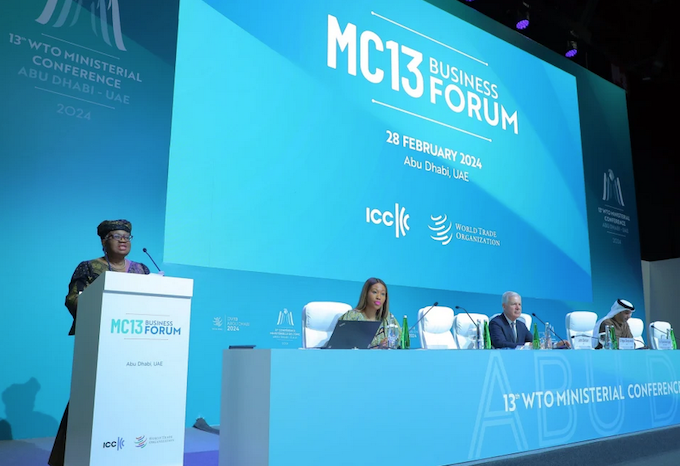
By Don Wiseman, RNZ Pacific senior journalist
The 13th Ministerial Conference (MC13) of members of the World Trade Organisation (WTO) is being held in Abu Dhabi in the United Arab Emirates.
Adam Wolfenden, who is there on behalf of Pacific Network on Globalisation (PANG), says the concerns of small Pacific nations centre on the subsidy provided by larger nations to fishing companies.
He said Fiji, in particular, was seeking a strong outcome on fisheries subsidies’ negotiations.
Wolfenden said the reason they were so concerned around fisheries subsidies was because of “the revenue and the importance of fisheries to the Pacific both at a governmental level, but also for the livelihoods of Pacific Islanders is enormous”.
He said this then raised concerns about how countries deal with overfishing and overcapacity, but did not prevent the small island nations from “developing their own domestic fleets to fish their resources and create a development pathway built on fisheries”.
Fiji’s Deputy Prime Minister and Trade Minister, Manoa Kamikamica, who is at the meeting, said: “Fiji will ask from its partners for stronger disciplines on subsidies contributing to overfishing and overcapacity in the negotiations that has caused the global depletion of fish stocks.”
“For us, this is more than a matter of national interest — it is a matter of national survival,” he said.
“Additionally, Fiji will highlight the importance of special and differential treatment for developing and least developed countries, including small island states, to ensure that trade policies take into account the specific challenges and vulnerabilities faced by these nations.”
Solomon Islands Foreign and Trade Minister, Jeremiah Manele, said the deliberations continued to undermine the responsible growth in his country’s fisheries sector “and further, the preservation of our fishing arrangements and differential licensing arrangements”.
“The current text maintains the status quo, leaning favourably towards the major subsidisers, with a mere focus on notifications and sustainability.”
MC13 is also focusing on reform of the WTO and Samoa’s Trade Negotiations Minister, Leota Laki Lamositele, said last year that “we reaffirmed that special and differential treatment for developing and Least Developed Country Members is an integral part of the WTO and its agreements”.
“As such, Samoa concurs with others in supporting the work of the WTO and that MC13 should ensure inclusive, transparent, and rules-based outcomes, to accommodate the diversity of WTO Membership in implementing current.”
‘A lot of uncertainty’
Civil society organisations have found themselves being shut out at this WTO meeting.
Wolfenden said there was a lot of concern about how non-government organisations were being treated in Abu Dhabi.
He said a lot of the activities that the groups would normally have been able to do — even just providing leaflets to journalists or directly engaging in advocacy — was being restricted.
“There’s a lot of uncertainty and a lack of clarity around what the security situation is with, you know, colleagues being detained for sending information to journalists for taking photos.
“We have sent a letter to the WTO director-general, I know this has been raised by a number of governments, including New Zealand, and the concerns around the way civil society is being treated.
“Yet there’s still no clarity and if anything, it feels like the way that we have been dealt with by local security is escalating.”
He added there was a lot of concern for participants and their safety within the conference venue.
This article is republished under a community partnership agreement with RNZ.












































